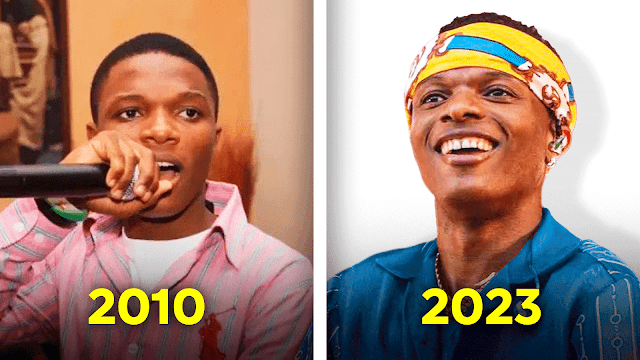Arguably one of afrobeats' biggest artistes, Wizkid is well respected in the world of music, and it’s not surprising that his popularity extends beyond the African scene. But Wizkid didn't become a star overnight. Just like every other success story, there's some context to how Wizkid reached where he is today. Some say it was a stroke of luck, others say it was due to his immeasurable talent and hardwork. Anyway, here's your chance to find out how Wizkid became…well, Wizkid. Let's get right into it.
This story begins in Ojuelegba, a suburb in Lagos state where Wizkid grew up. Born Ayodeji Ibrahim Balogun on July 16, 1990, he was part of a relatively large family with twelve siblings, as a result of his father having three wives. Raising a child in the rough streets of Ojuelegba was not so easy, and the Balogun family were not particularly rich either. His mother was a Christian while his father was a Muslim. As he got older, Wizkid attended Ijebu Ode Grammar School in Ogun State, where he likely encountered different experiences that contributed to shaping his personality and interests.
Wizkid's interest in music started when he was much younger. He joined his church's choir at the age 11, and that was the very start of everything. He learned various instruments there and also honed his singing. This was basically the foundation upon which Wizkid built a solid music foundation. He soon created a music band with a couple of his friends from church, which they called "the Glorious Five."
Going into music professionally, he started his career with the stage name, Lil Prinz, and released an album while using that name. At the time, he was relatively unknown, at least until he met OJB Jezreel in 2009. His meeting with OJB Jezreel was the beginning of his break in the world of music. Jezreel was impressed by his talents and decided to give the youngster a chance under him. Wizkid was prevented from recording any song in his first year with the producer. The man wanted Wizkid to learn, observe, and later put what he'd learned into his music. Well, what better way to learn than from 2Baba himself, who was already a well known artiste at the time, and was about to release another album titled "Grass to Grace" under OJB Jezreel. He also spent time watching Sound Sultan, who was also recording in Jezreel's Point Beat Studios. This experience was enough to mold Wizkid to become the star he was about to be.
Wizkid would soon sign a deal with Banky W's record label, Empire Mates Entertainment (EME) in 2009. In order to focus totally on his music, he dropped out of Lagos State University, a decision his father wasn't entirely happy about.
Soon, all of Wizkid's focus was on getting his music career on track. He began recording his first album, due to be released in 2011. But before that, he released the lead single of his album titled "Holla at your Boy", which made him experience true stardom. The song would later earn him the Next Rated Award at the 2011 edition of The Headies. In addition to his next rated award, he was award ed a 2012 Hyundai Sonata. In fact, the music video for the song was also nominated for "Most Gifted Newcomer Video" at the 2011 Channel O Music Video awards.
Wizkid soon released the second song on his album titled "Tease Me/ Bad Guys" on 2nd April 2010. The entire album titled "Superstar" was released by Empire Mates Entertainment on 12 June 2011 and it was the beginning of Wizkid's fame and stardom. The album featured many chart topping singles like "Pakurumo," Love my Baby," and "Don't Dull." It also included guest appearances from already known stars at the time like Banky W, D'Prince, and Wande Coal.
In 2012, Wizkid and the EME record label organized a tour in London. He performed his first show abroad at the HMV Apollo on 4th June 2012. The tour also included the release of a compilation album by EME titled Empire Mates State of Mind. During the tour, Wizkid got an opportunity to perform alongside Trey Songz, Kendrick Lamar, and Tulisa.
After experiencing that first burst of fame and stardom, Wizkid was determined to gain even more stardom. He began preparations for his second studio album in 2012, which was titled "Ayo." In 2013, he established his own record label, Starboy Entertainment, but he still worked with EME in the production of his songs. At this point, Wizkid was quickly becoming very popular all over Nigeria, and in 2014, he became the first Nigerian musician to have over one million Twitter followers. Wizkid's second album was released in September 2014, and it included the hit song "Jaiye Jaiye," which he sang with Grammy award nominee, Femi Kuti. The album also featured "Caro" and "Show you the Money." 2015 was another huge year for Wizkid. He released "Ojuelegba," a song that highlighted his initial struggles, and his journey to stardom. Thanks to the song’s catchy rhythm, It became so popular that Drake jumped on it for a remix.
However, that wasn't the end of his collaboration with Drake. In 2016, they joined forces together with British singer Kyla to create "One Dance", a song that broke several records and topped the US Billboard Hot 100 chart for 10 weeks.
So at this point Wizkid was already well known all over the world, but he had not made a big international impression just yet. But after releasing "Soco" in 2018, he became the first Afrobeats artiste to have a song certified Gold in Canada.
Wizkid was truly flying high and it seemed like things could only get better for him, and it did. In 2019, he was featured on Beyonce's hit song "Brown Skin Girl," for The Lion King album. Probably one of Wizkid's best moments in the music industry, the song earned him recognition all over the world, and soon he had an international fan base. Wizkid finished the year with other hit songs like "Joro," "Ghetto Love," and the EP Soundman Volume 1.
The next year was a relatively quiet one from Starboy. He got featured in a couple of songs, including "Escape" by Akon and "Eve Bounce" by Yung L. In September 2020, after releasing the single "No Stress," he announced the imminent release of his fourth studio album "Made in Lagos."
The release of "Made in Lagos" had to be postponed due to the nationwide End SARS protests that rocked Nigeria, where the youths demanded an end to the pestering police brutality. When the album was finally released on 30th October 2020, it dropped with a bang. A single from the album titled "Essence" made it to the US Billboard Hot 100, making it the first Nigerian song to do so. Wizkid knew just how much people loved this song, so he did a remix of the song with Justin Bieber, and this time it did even better than the original, peaking at number 11 on the US Billboard Hot 100. This made it the highest charting song on the Billboard Hot 100 by an African.
During the 2021 Grammy awards, the Made in Lagos album and "Essence" earned Wizkid two Grammy nominations. He also won one Soul Train Award for "Essence" as the Best Collaboration. Wizkid also bagged his first Grammy award for the Best Music Video alongside Beyoncé.
Aside from music, Wizkid has also earned a large share of his income from endorsement deals with major companies like Glo, Pepsi, and recently Airtel. He also has major fashion collaborations.
Today, Wizkid is one of the most famous Afrobeats' artiste, and has earned numerous awards and accolades. His success is based on his immense talent, hard work, and dedication, which has brought him this far.
What do you think about Wizkid's story? Do you think he is Afrobeats biggest ever artiste?

